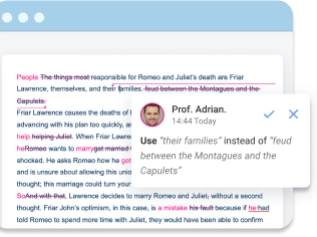Lie, Lay, Laid and Lain: Memorable Hints for Students
Table of contents
Struggling with when to use lay vs. lie is a common challenge, even for native English speakers and seasoned writers. Although these two words sound alike and share a similar meaning, they have distinct uses in English grammar.
Lie refers to reclining or being in a horizontal position without a direct object, while lay means to place something down, requiring an object.
Understanding these differences is crucial to mastering their correct usage in writing. In this article, we’ll break down the rules and provide clear examples to help you confidently use lay and lie in your own writing.
Understanding ‘Lie’
The verb “lie” means to recline or rest in a horizontal position. It is an intransitive verb, which means it does not require a direct object. The action of lying down is something that a person or an animal does by themselves.
Lie does not require a direct object:
- Present: I lie on the bed.
- Past: Yesterday, I lay on the bed.
- Past participle: I have lain on the bed.
- Present participle: I am lying on the bed.
Still unsure about common grammar mistakes? Learn how to punctuate your writing correctly and sharpen your writing skills with our expert tips!”
Understanding ‘Lay’
On the other hand, “lay” is a transitive verb, meaning it requires a direct object. It means to put or place something down.
Layrequires a direct object:
- Present: I lay the book on the table.
- Past: Yesterday, I laid the book on the table.
- Past participle: I have laid the book on the table.
- Present participle: I am laying the book on the table.

As you can see, according to these definitions, lay down vs. lie down mean two separate things. However, this isn’t the end of the rules regarding how to use these two words.
Considering all of the rules associated with lie and lay, it might take some time before you can use them confidently. In the meantime, you may want to consider using a “grade my paper” service to ensure your writing is error-free. An expert writer will review your paper and make sure these words are used correctly.
To truly be able to use them in the correct context each and every time, you are going to have to read the rules below.
When Use Lay and Lie Verbs
Now, before learning how to use lay and lie, you should be aware of another fact.
There are several forms of these words as well.
Therefore, you have to contend with lay, lie, laid, laying, lying, lain as well. While all of this may sound rather confusing, the necessary rules will be mentioned below.
Lie:
- Present tense: “lie” (e.g., “I lie on the bed.”)
- Past tense: “lay” (e.g., “Yesterday, I lay on the bed.”)
- Past participle: “lain” (e.g., “I have lain on the bed.”)
Lay:
- Present tense: “lay” (e.g., “I lay the book on the table.”)
- Past tense: “laid” (e.g., “I laid the book on the table.”)
- Past participle: “laid” (e.g., “I have laid the book on the table.”)
Here’s a quick overview of the different forms of “lie” and “lay” across various tenses to help clarify their usage:
| Tense | Lie | Lay |
|---|---|---|
| Present | lie | lay |
| Past | lay | laid |
| Past Participle | lain | laid |
| Present Participle | lying | laying |
To avoid any confusion in your writing, using write my college paper assistance can be a great help. After all, they are there to make sure that the final piece of writing is error-free and grammatically correct.
Examples of Usage
Present Tense
Lay and lie are the present tense forms of these words. Therefore, sentences containing them would appear as such:
- I am very particular about where I lay my clothes when in a dressing room.
- She likes to lie down on the sofa for naps.
Present Participle
- He is laying the table carefully so that he doesn’t move any of the plates.
- She likes to spend her days off lying on her bed, reading.
Past Tense
- Yesterday, the child lay down on the muddy ground.
- The man laid the book on the table with a great deal of force.
Once you get used to this rule, you will find it easier to understand the lay vs. lie and laid relationship.
Learning the proper usage of that vs. which can further improve your sentence structure and make your writing more precise.
Past Participle
Then, there is the matter of lie, lay, laid vs. lain. This is to do with the past participle form of the words lie and lay.
In short, the past participle of lay is laid while the past participle of lie is lain. Here is an example of this:
- She has laid all of the towels on the floor in a heap.
- The dog has lain in that puddle for most of the day.
How to Remember Usage Lay vs. Lie?
To easily distinguish between “lie” and “lay,” keep these key points in mind:
- Remember the Direct Object: The easiest way to distinguish between “lie” and “lay” is to remember if the action involves a direct object. If you’re placing something somewhere, use “lay.” If the subject of your sentence is reclining by itself, use “lie.”
- Conjugation Matters: Pay close attention to the tense you are using. The past tense of “lie” is “lay,” which often leads to confusion. Remembering the phrase, “Yesterday, I lay down for a nap,” can help keep this straight.
- Practice with Examples: Creating sentences using both verbs in different tenses can be a practical way to understand their usage. Examples include:
“I like to lie down after lunch” (present tense of “lie“).
“Last night, I laid the keys on the counter” (past tense of “lay“).
“She has lain on the beach all morning” (past participle of “lie“).
- Common Mistakes: A common error is using “lay” instead of “lie” for reclining. For example, saying “I’m going to lay down” is incorrect; it should be “I’m going to lie down.” To learn more about similar common mistakes, check out our guide on the correct usage of apart.
- Useful Mnemonics: “lay a tray; lie in May.” This rhyme helps remember “lay” as an action involving an object (tray) and “lie” as something you do yourself, perhaps leisurely in May.
- The Role of Context in Understanding: Context is essential for correctly using these verbs. For example, the sentence “I’m going to lay on the bed” is wrong because “lay” requires a direct object. The correct version is “I’m going to lie on the bed.” Always consider the context when using these verbs.
By following the above advice, and getting some additional assistance, you will have no trouble with any form of writing at all. Instead, you will be able to easily create work that is beyond reproach and able to meet even the highest of standards.







